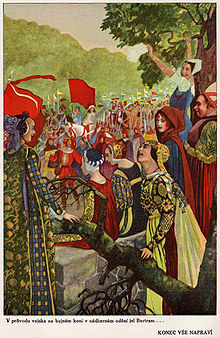All's Well That Ends Well
play by Shakespeare
All's Well That Ends Well is a play by William Shakespeare. It is often considered one of his problem plays, not easily classifiable as a comedy or tragedy. It was probably written in the later middle part of Shakespeare's career, between 1601 and 1608.

Are motives of more fancy.
Act I
edit- Be thou blest, Bertram; and succeed thy father
In manners, as in shape! thy blood and virtue
Contend for empire in thee; and thy goodness
Share with thy birthright! Love all, trust a few,
Do wrong to none: be able for thine enemy
Rather in power than use, and keep thy friend
Under thy own life’s key: be check’d for silence,
But never tax’d for speech. What heaven more will
That thee may furnish, and my prayers pluck down,
Fall on thy head!- Countess Of Rousillon, Act I, Scene i
- 'T were all one
That I should love a bright particular star,
And think to wed it.- Helena, scene i
- The hind, that would be mated by the lion,
Must die for love.- Helena, scene i
- Our remedies oft in ourselves do lie,
Which we ascribe to Heaven.- Helena, scene i
- His good remembrance, sir,
Lies richer in your thoughts, than on his tomb;
So in approof lives not his epitaph,
As in your royal speech.- Bertram, scene ii
- Service is no heritage.
- Clown, scene iii
- He must needs go, that the devil drives.
- Clown, scene iii
- Even so it was with me, when I was young:
If we are nature’s, these are ours; this thorn
Doth to our rose of youth rightly belong:
Our blood to us, this to our blood is born;
It is the show and seal of nature’s truth,
Where love’s strong passion is impress’d in youth:
By our remembrances of days foregone,
Such were our faults; — or then we thought them none.
Her eye is sick on’t: I observe her now.- Countess of Rousillon, scene iii
- My friends were poor, but honest.
- Helena, scene iii
Act II
edit- Great floods have flown
From simple sources; and great seas have dried,
When miracles have by the greatest been denied.
Oft expectation fails, and most oft there
Where most it promises.- Helena, scene i
- I will show myself highly fed, and lowly taught.
- Clown, scene ii
- They say, miracles are past.
- Lafeu, scene iii
- All the learned and authentic fellows.
- Lafeu, scene iii
- From lowest place when virtuous things proceed,
The place is dignified by the doer’s deed.- King of France, scene iii
- A young man, married, is a man that ’s marr’d.
- Parolles, scene iii
- Make the coming hour o’erflow with joy,
And pleasure drown the brim.- Parolles, scene iv
Act III
edit- No legacy is so rich as honesty.
- Mariana, scene v
Act IV
edit- The web of our life is of a mingled yarn, good and ill together.
- 1st Lord, scene iii
- Simply the thing I am
Shall make me live.- Parolles, scene iii
- All's well that ends well still: the fine's the crown;
Whate'er the course, the end is the renown.- Helena, scene iv
Act V
edit- Whose words all ears took captive.
- Lafeu, scene iii
- Praising what is lost,
Makes the remembrance dear.- King of France, scene iii
- For we are old, and on our quick'st decrees
The inaudible and noiseless foot of time
Steals, ere we can effect them.- King of France, scene iii
- All impediments in fancy’s course
Are motives of more fancy.- Bertram, scene iii
- 'T is but the shadow of a wife you see,
The name and not the thing.- Helena, scene iii
- The bitter past, more welcome is the sweet.
- King of France, scene iii